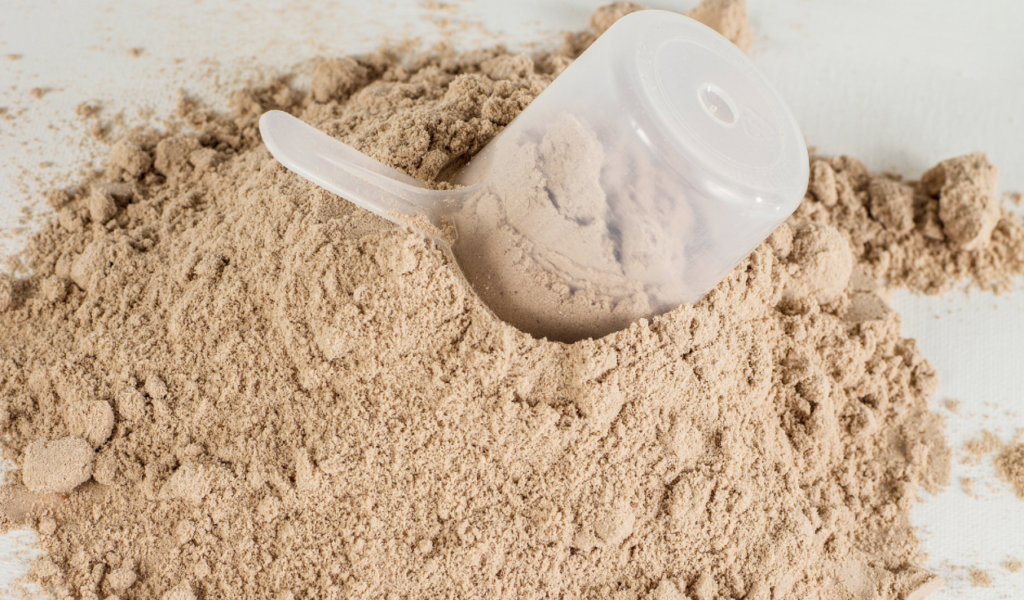
Many people take casein protein because it absorbs slowly and provides a steady stream of fuel for building muscle.
Casein protein is a type of protein derived from cow’s milk.
While it’s less commonly used as a supplement than its closely related cousin, whey protein, casein protein is useful in situations such as recovering from tough workouts and building muscle gains.
With the increasing popularity of casein protein, there are a lot of brands offering similar formulations.
Whose is the best? Our research team set out to answer that question for you.
1. BulkSupplements Casein
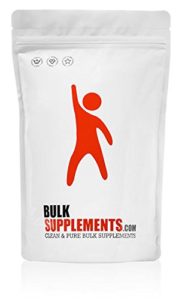
Click here for the lowest price on Amazon
As is usually the case, BulkSupplements does a marvelous job when it comes to the minimalist version of casein protein.
The powder comes in a simple zip-top bag, in quantities of up to 11 pounds. There are only two ingredients, powderized casein and soy lecithin to emulsify the powder when it is mixed with water.
This simple formulation is great if you don’t want unnecessary extras in your protein powder, but if you don’t like the chalky, chunky taste of plain protein you may not like it as much.
You’ll also have to work harder to get it to mix well into your protein shakes.
2. Naked Casein
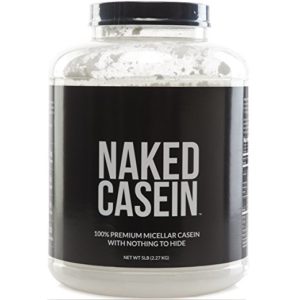
Click here for the lowest price on Amazon
If truly all you want is one hundred percent pure casein protein, Naked Casein is definitely the way to go.
Blending up this protein into a shake or smoothie is going to be challenging because of the lack of any emulsifying agents, so you’ll really need to shake it up, or use a blender, to get Naked Casein to blend well into your solution of choice.
If you are making your own meal replacement or mass gainer, you can add in your own emulsifier as needed.
3. Ascent Native Fuel Casein
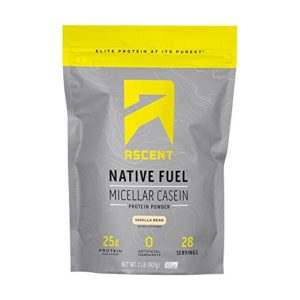
Click here for the lowest price on Amazon
If you want a nice middle of the road casein protein that uses simple and straightforward ingredients, but still tastes good and isn’t difficult to blend into a protein shake, Ascent Native Fuel Casein is an excellent choice.
It uses cocoa powder, natural flavors, and the natural non-caloric sweeteners in monk fruit extract and stevia to ensure a good taste, alongside natural emulsifiers to blend well with liquids, but there aren’t any off-putting artificial ingredients or unnecessary extraneous things included in the formulation.
4. Optimum Nutrition Gold Standard Casein
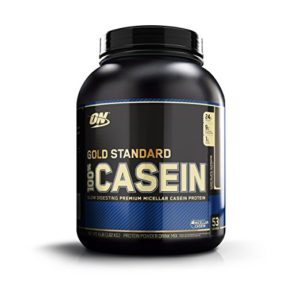
Click here for the lowest price on Amazon
Optimum Nutrition’s casein protein comes in a huge four-pound tub and delivers the casein protein in a micro-powderized form that makes it easy to blend into a drink and resistant to chunking up.
It’s flavored with both natural and artificial flavors, and the mixability is aided further by the inclusion of several emulsifiers.
It’s not going to be the go-to option for protein purists, but if you want functionality above all else, it’s an excellent choice.
5. Dymatize Elite Casein
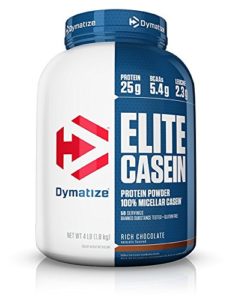
Click here for the lowest price on Amazon
Dymatize’s casein offering is another in the functional protein category.
It’s flavored with cocoa powder, natural flavors, and sucralose, and it uses emulsifiers from soy and sunflower to make the powder easier to mix up into a smoothie or a shake.
The soy ingredients and artificial sweeteners might be a turnoff to some people, but it’s still a solid choice.
6. Cellucor COR-Performance Casein
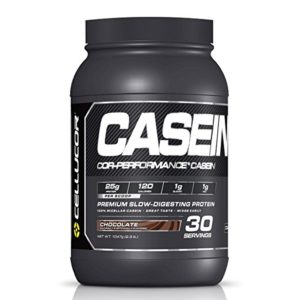
Click here for the lowest price on Amazon
Cellucor’s casein protein offering is pretty solid. It’s mostly what you’d expect from a big manufacturer: flavored with both natural and artificial sweeteners, and including several emulsifying agents and anti-caking compounds to make it store well and blend up easily.
This appeals to some people, but will turn off the purists. In any case, it’s a very solid casein protein powder.
7. MuscleTech Platinum Casein
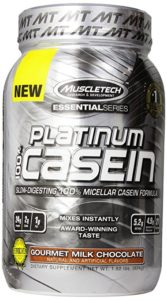
Click here for the lowest price on Amazon
MuscleTech Platinum Casein is a protein powder that will blend up well and taste good, but it accomplishes this by using a lot of artificial flavors, sweeteners, coloring agents, and anti-caking agents.
If you are okay with this, it’s a decent choice, but other manufacturers manage to accomplish the same goals–good taste and easy mixing–without quite so much in the way of extra ingredients.
8. BSN Syntha-6
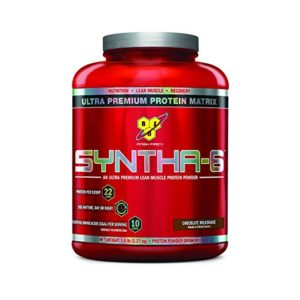
Click here for the lowest price on Amazon
BSN’s Syntha-6 is a protein powder formulations that tries to take advantage of the strengths of both whey and casein protein. Providing a blend of whey, milk, and casein protein, alongside a whole host of sweetening and flavoring agents, this protein powder tends more towards the meal replacement or mass gainer side of the spectrum.
The added extras for health, like MCT oils, are a nice touch, but if your primary goal is taking advantage of the benefits of casein protein, there are better options out there for you.
9. Six Star Casein Protein
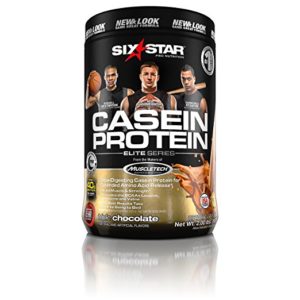
Click here for the lowest price on Amazon
While Six Star Casein Protein is sold as a protein powder, it’s almost closer to being a meal replacement or a mass gainer than just protein.
There’s a substantial amount of maltodextrin in the formulation, which gives it a higher carbohydrate content than plain protein. As you’d expect with a product like this, it’s flavored with natural and artificial flavorings and sweetened with sucralose.
One major downside is that the “casein blend” is actually made up mostly of milk protein isolate; true casein protein is a secondary ingredient. This means you won’t get as much of the benefits of casein, like its slow digestive rate.
10. EAS Whey + Casein
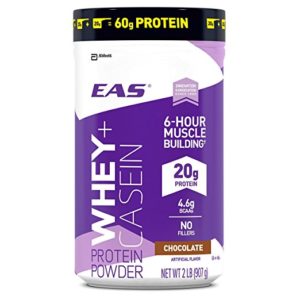
Click here for the lowest price on Amazon
EAS is another protein powder that attempts to take advantage of the benefits of both whey and soy protein. While the formulation is pretty straightforward, the name is a little deceiving: the only casein protein in the blend comes from the portion of milk protein that consists of casein.
This means that the actual casein content is going to be quite low, so this will mostly be more of a sweetened and emulsified whey protein concentrate, without many of the benefits of casein protein.
Casein protein benefits and side effects
While it’s not the most popular protein powder in general, casein protein, which is derived from the protein that is in cow’s milk, has a number of particular benefits that make it very useful for building muscle and recovering from workouts.
Unlike the more popular whey protein, it’s digested slowly by your body, providing a steady stream of protein to build and repair muscle fibers that are stressed during workouts.
Benefits
The distinctive features of casein protein as compared to its counterpart, whey protein, are well-described in a scientific study published in 2010 in the American Journal of Physiology: Endocrinology and Metabolism by researchers at the Institute of Sports Medicine in Copenhagen, Denmark (1).
The researchers wanted to know how whey and casein protein affected levels of amino acids in the blood following weight training, so they created two protein drinks consisting of casein and protein powder labeled with a special weakly radioactive isotope.
The three groups of subjects drank either a whey protein shake, a casein protein shake, or a control beverage with no protein or carbohydrates in it immediately after a weight lifting protocol.
The researchers found that blood levels of branched chain amino acids rose faster and to a higher peak in the whey protein group, but insulin also rose faster.
Aside from that, differences in the overall response to the protein ingestion was quite similar. This suggests that whey and casein protein accomplish many of the same things, but that whey is more rapidly absorbed and leads to a spike in both branched chain amino acids and in insulin after ingestion.
This spike could be a good thing if you want to jump start your recovery or use branched chain amino acids as fuel during exercise, but if you want a steady supply of building blocks for your muscle, casein might be the better choice.
Research published in the British Journal of Nutrition highlighted some additional differences in whey and casein protein (2).
One study, published in 2007, compared whey protein and casein protein in terms of their post-ingestion effects on hunger and amino acid levels in the body.
With respect to the amino acid levels in the blood, the researchers got similar results to previous work: whey protein leads to a more rapid spike in amino acid concentrations, indicating it is absorbed more quickly.
There was one interesting difference, however. Because whey protein appears to be absorbed more quickly, you’d expect it to have a weaker effect on satisfying post-ingestion feelings of hunger.
However, the researchers found the opposite. Feelings of satiety–the sensation of fullness you get after a large meal–were actually larger in the whey protein group than in the casein protein group.
This indicates that there are deeper hormonal responses to whey versus casein protein ingestion.
Other work indicates that casein protein may not be as effective in older men than it is in younger men.
The research, published in the American Journal of Clinical Nutrition, tested how older men (about 74 years old) responded to a whey protein or a casein protein drink following a meal of each (3).
The study found that higher muscle synthesis rates occurred in the men after the whey protein drink versus the casein protein drink.
This might indicate that older men can’t process casein protein as well, or it may just be evidence that whey protein is better immediately following a workout to jumpstart your muscle synthesis, and that casein should be used as a slower-absorbing supplement to whey protein.
Side effects
Since casein protein is a major constituent of cow’s milk, the side effects profile is almost nonexistent.
If you have a milk allergy, you should stay away from casein protein (as well as other dairy proteins, like whey protein) but even people who are lactose intolerant can usually tolerate casein protein just fine, since the lactose content is so low. Lactose is more of an issue in unprocessed dairy products like milk, soft cheeses, and ice cream.
If you do find yourself getting bloating, gas, digestive issues, or gastrointestinal discomfort, try replacing your casein protein with a vegan protein powder and see if your symptoms get better.
If they do, you might be highly lactose intolerant, or just have a milk allergy, and if that’s the case, casein protein is not the right supplement for you.
Recommended dosage
According to recommendations from M. A. Tarnopolsky and colleagues at McMaster University in Canada, protein requirements are substantially higher for athletes undergoing strength training when compared to the general population (4).
They conducted a study that used advanced methods of tracing whole body protein balance and found that strength training increases the body’s demand for protein to approximately 1.76 grams per kilogram of body mass per day.
This means that a 200 pound athlete (91 kg) would need at least 160 grams of protein per day.
Sedentary people can benefit from casein protein too. Their needs are lower, however; according to Tarnopolsky and the other researchers at McMaster University, a sedentary person only needs about 1.0 grams of protein per kilogram of body mass per day.
While casein protein is absorbed more slowly than whey protein, it’s still going to be absorbed completely within a few hours, so it’s best to split up your daily protein needs into several smaller servings spread throughout the day.
This is especially true if you are working out more than once per day.
Recap
Casein protein is a slow-acting counterpart to whey protein.
While whey protein is great if you want an immediate boost of amino acid levels in your blood, or if you want to be burning branched chain amino acids as fuel during a workout, for a steady stream of protein delivered to your muscles, casein works best.
If you are engaging in strength training, you should shoot for 1.76 grams of protein per kilogram of body mass per day–remember this is total protein, so include other sources of protein in your diet for this calculation as well.
People who aren’t weight lifters or strength athletes have lower needs for protein; they should aim for one gram of protein per kilogram of body mass per day.
https://bodynutrition.org/casein-protein/
No comments:
Post a Comment